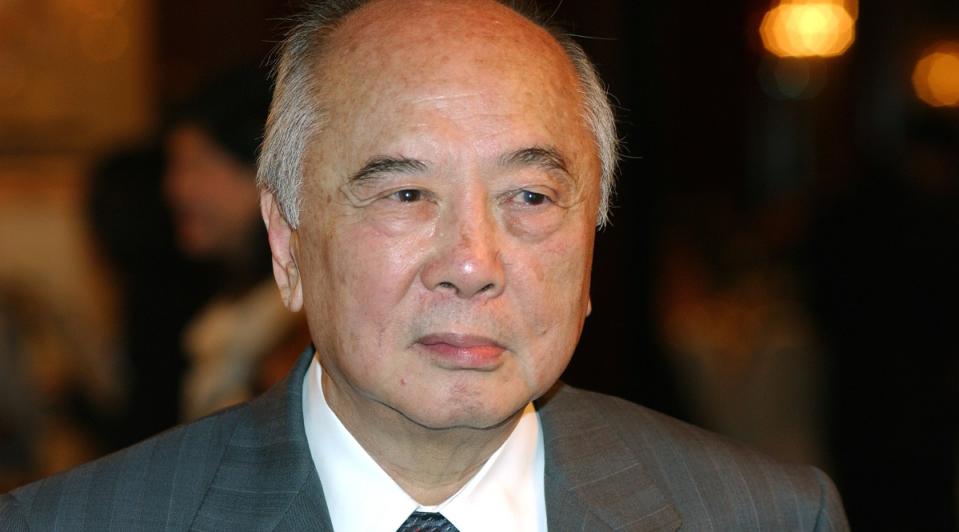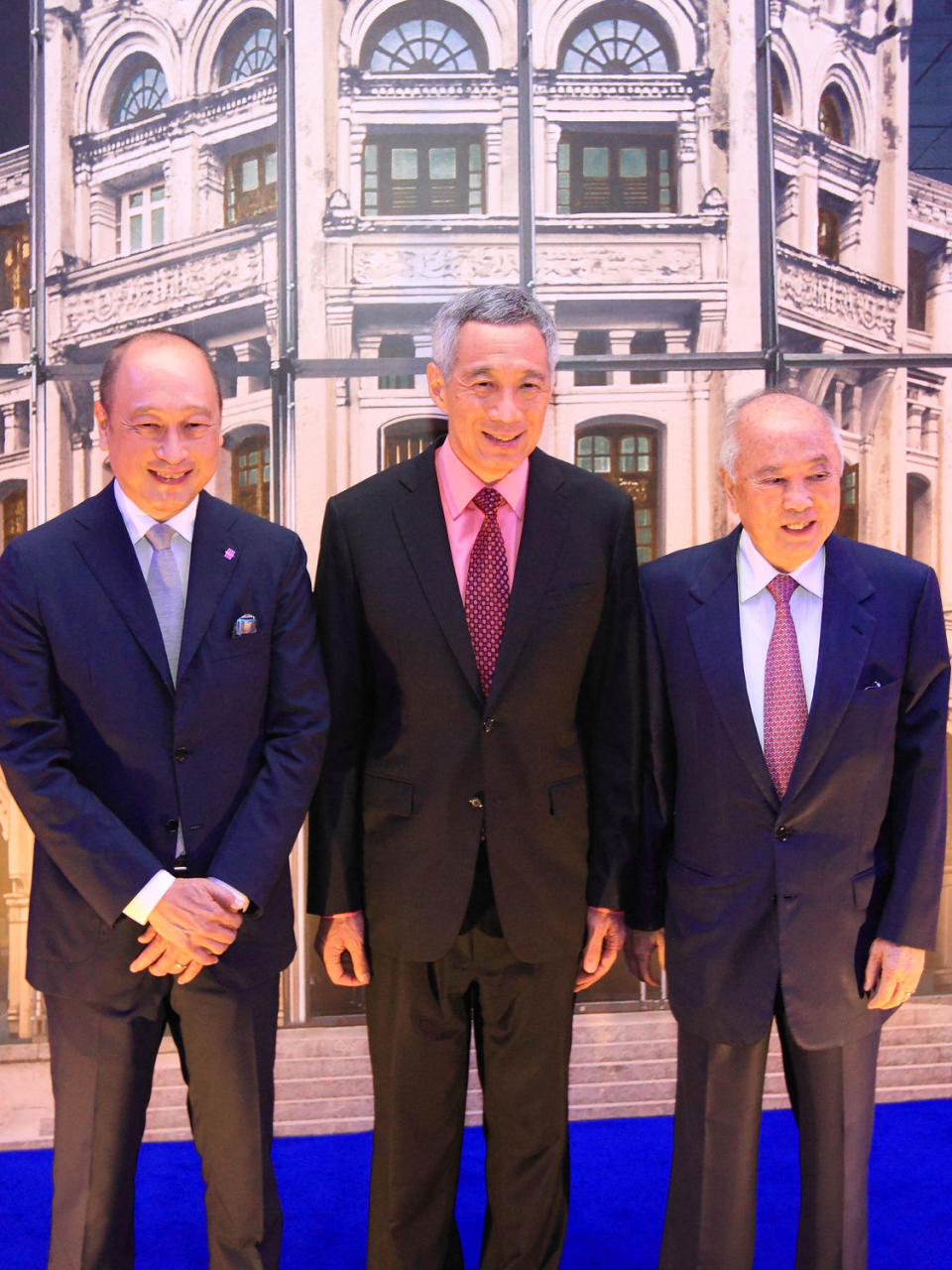Eminent banker Wee Cho Yaw of UOB dies at 95

His family founded UOB.
Wee Cho Yaw, chairman emeritus of United Overseas Bank U11 has passed away. He was 95.
For decades, Wee is synonymous with the bank his father Kheng Chiang founded in 1935 in Sarawak, to a leading Singapore-based international banking group with a market value of around $50 billion.
For years, after he stepped down from his official posts in the bank, Wee was known to still go into the bank’s office at Raffles Place regularly.
“My father has left an indelible mark in Singapore and the region. He has been a source of inspiration for me in all aspects of my life," says UOB deputy chairman and CEO Wee Ee Cheong, whose office was next to his father's.
"Much will be said about his business acumen and dealmaking but it will be the values of honour, enterprise, unity and commitment that will be the legacy he leaves us at UOB.
"Whether it is through thinking for the long-term, the importance of deep relationships, doing the right thing or giving a helping hand to those in need, the influence of my father and his values will endure at UOB," adds Ee Cheong.
After Wee assumed management of what was then called United Chinese Bank (UCB) in the 1960s, he introduced new services like foreign exchange dealing, and expanded it regionally. He also moved big into property, buying up choice plots, including the spot by the Singapore River where the bank’s headquarters stands.
Riding on the region’s rapid economic growth in the 1970s and 80s, Wee grew UOB fast and brought a number of other banks into its fold, establishing a reputation for being both a business builder and adroit dealmaker. Notably, he bought Chung Khiaw Bank in 1971, which doubled UOB’s size and two years later, snapped up Lee Wah Bank in 1973, Far Eastern Bank in 1984 and Industrial and Commercial Bank in 1987.
Merger of UOB and OUB
Wee was seemingly contented to grow organically but his biggest deal, which was to take place more than a decade a later, was in a sense thrust on him.
In the wake of the Asian Financial Crisis, MAS began pushing the banks to shed their non-core assets, hitting UOB and rival across the road OCBC especially hard – given the web of stakes they held in other listed companies especially in property.
“Regulators cannot leave it entirely to the market to sort out such matters, especially where the banks involved are not peripheral players but perform key roles in deposit taking and the payments system,” says then deputy prime minister Lee Hsien Loong back in 2000. At the same time, the banks were being pushed to merge, ahead of looser rules for foreign banks in their operations here.
Government-linked DBS had already acquired POSB in 1998, gaining a huge pool of retail deposits. In 2001, OCBC acquired Keppel TatLee in a $5.21 billion deal. Within months, DBS made a hostile bid of $9.4 billion for OUB, to the dismay of its founder and controlling shareholder Lien Ying Chow.
That’s when Wee swooped in. He personally visited then 95-year-old Lien, and two longtime rivals shook hands on a better offer of $10 billion.
Until the merger of CapitaLand and Ascendas-Singbridge in 2019 for $11 billion, which was essentially an arranged marriage, UOB’s takeover of OUB was not just the biggest merger & acquisition transaction between two Singapore companies then – it was also remembered for the high drama.
In the heat of the battle, Goldman Sachs, the financial adviser to DBS, distributed documents describing UOB’s rival offer as being “designed to keep family control intact without regard for shareholder value”. Apologies were offered by both S Dhanabalan, the then chairman of DBS, and Henry Paulson, the then CEO of Goldman Sachs.
At a briefing on June 29, 2001 to explain the deal, a young analyst asked then 72-year-old Wee if it was wise to go up against a government-linked company like DBS. Wee shot back, without missing a beat: “You trying to scare me is it?”'
Having emerged as a clear winner following decades of consolidation, UOB would not make another big acquisition until last year under Wee Ee Cheong, Cho Yaw’s son, acquired the consumer of Citibank in four regional markets for almost $5 billion.
Dealing with shareholders
While Wee and his family hold a controlling stake of more than 18% in the bank but he remains in tune with what other shareholders want and feel.
At one memorable AGM held at the bank's penthouse at UOB Plaza 1, voting for the reappointment of directors was done via a show of hands.
One of the directors up for reappointment was the late founder of Creative Technology C76, Sim Wong Hoo, whose company was in a bruising fight against Apple in the digital music players war then.
When Sim's reappointment as an independent director was put to vote, a fund manager put up his hand to say no.
Wee raised his eyebrows and said "You are voting against?!?" But he accepted it. A banker and a gentleman.
Towards other shareholders, Wee has other means. In another memorable episode in the 2000s, hedge fund Laxey Partners accumulated 10% of Wee's then listed investment holding arm United International Securities (UIS).
As with most investment holding companies, UIS traded at a discount to its net tangible asset. Andrew Pegge, who managed the fund, grumbled to The Edge Singapore a couple of times about UIS’ valuation.
Laxey Partners requisitioned EGMs at least twice, in a bid to remove Wee as chairman, and to privatise UIS, but to no avail. Finally, Laxey Partners divested its UIS stake - and UIS was subsequently privatised at NTA in 2014.

From left: UOB CEO Wee Ee Cheong, Prime Minister Lee Hsien Loong and Wee Cho Yaw at the event marking the bank's 80th anniversary / Photo: The Edge Singapore
Community, country
In a statement, UOB calls Wee a "visionary banker, celebrated businessman and community pillar, was pivotal to UOB’s development as a leading bank in Asia."
The bank adds how in the five decades under Wee, it grew from just one branch to a regional bank in 19 countries and territories, with assets surging from $2.8 billion to more than $253 billion at the time of his retirement as chairman in 2013.
Wee is a leading community leader too. He was the founding president of the Singapore Federation of Chinese Clan Associations (SFCCA) from 1985 to 2010; he headed the Hokkien Huay Kuan from 1972 to 2010.
Among the many accolades he received, there was the Distinguished Service Order (Singapore’s highest National Day Award), Asean Business Advisory Council Legacy Award for Singapore and Honorary Degrees of Doctors of Letters from the National University of Singapore and Nanyang Technological University.
UOB chairman Wong Kan Seng calls Wee one of Singapore’s most successful entrepreneurs.
"Through hard work, determination, decisiveness and strong Asian values, he built UOB into one of the world’s most admired banks," says the former deputy prime minister.
"His towering presence can be seen across Singapore through the many industries, businesses, individuals and communities that UOB has supported over the years. He has also made many important contributions to the development of Singapore as a global financial centre," adds Wong.
The funeral is slated to take place on Feb 7.
See Also:
Click here to stay updated with the Latest Business & Investment News in Singapore
OCBC’s new AT1 subordinated perpetual notes may have tightening potential: Bloomberg Intelligence
Get in-depth insights from our expert contributors, and dive into financial and economic trends

 Yahoo Finance
Yahoo Finance 